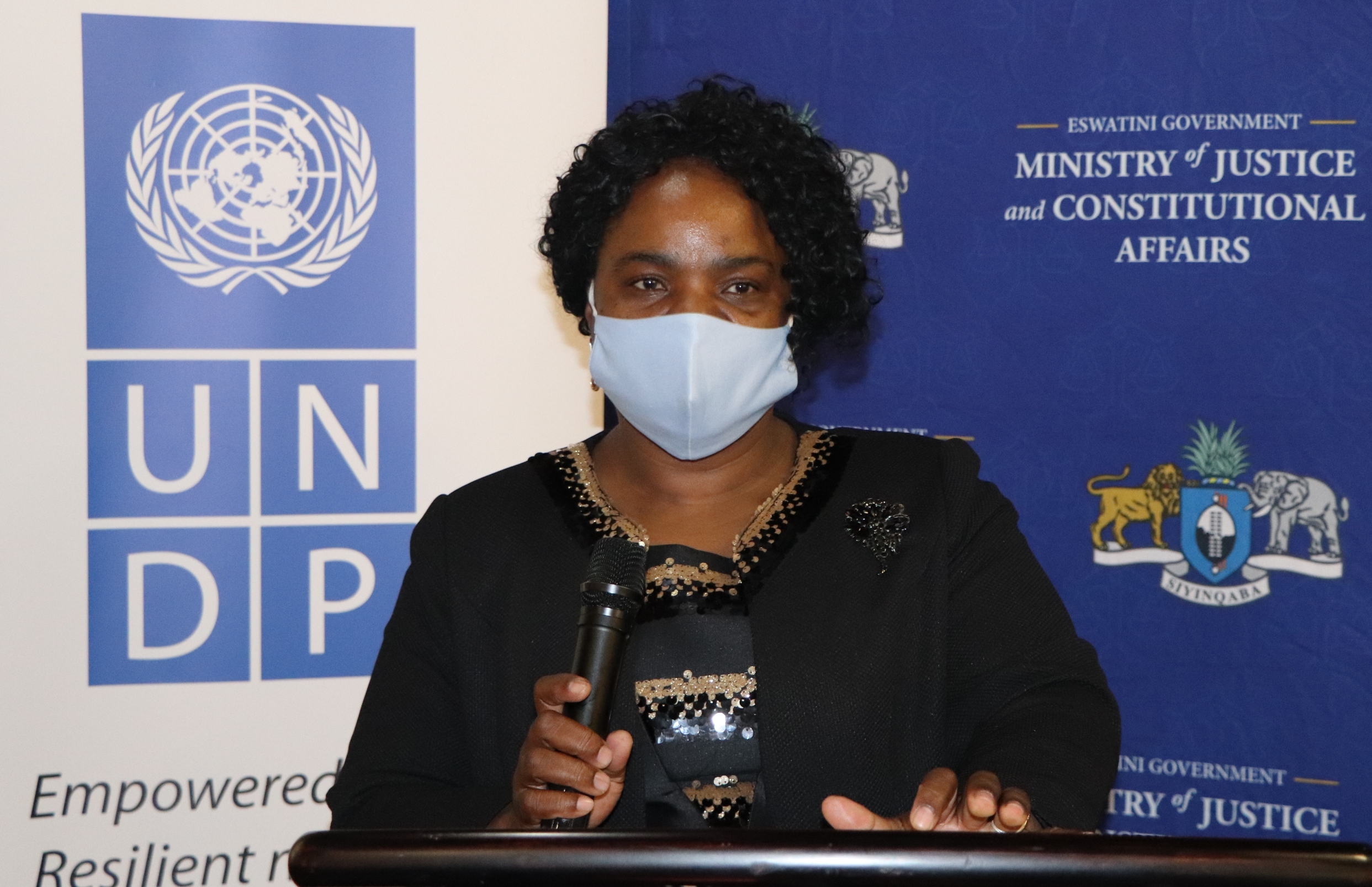Leaving No One Behind Through Legal Aid
Principal Secretary at the Ministry of Justice and Constitutional Affairs, Ms Lorraine Hlophe, addressing participants at the Legal Aid Seminar.
By Mantoe Phakathi
The Ministry of Justice and Constitutional Affairs (MOJCA) aspires to set up the legal aid system for the Kingdom of Eswatini before the end of the year. Speaking at a Legal Aid Seminar, which UNDP held jointly with MOJCA and the American Bar Association (ABA);, the Principal Secretary, Ms Lorraine Hlophe, said lacking a legal aid system in the country is one of the major barriers to access to justice, a priority that the Ministry is working around to resolve.
Ms Hlophe was addressing legal practitioners, representatives of civil society organizations and development partners at Sibane Hotel on June 16th. Ms Hlophe said the Legal Aid Bill process, which was supported by UNDP Eswatini, started in 2012 and went through several rounds of stakeholder engagements, but has since stalled whilst it is aligned with other existing legislation.
She said the country is facing a backlog of cases, with the exception of cases that would attract capital punishment, because there is an absence of Legal Aid services for destitute people facing criminal charges.
“The position of our law at present is that the government is enjoined to provide pro deo counsel where a suspect is indicted for an offence that may attract capital punishment upon conviction,” she said, adding: “The establishment of legal aid will thus greatly assist in enabling the judiciary to eradicate case backlogs.”
Ms Hlophe said the establishment of a Legal Aid system is in line with Goal 16 of the Sustainable Development Goals which encompasses the promotion of the rule of law and ensuring access to justice for all marginalised groups including children, women and persons living with disabilities.
“Legal aid services play a critical role in ensuring the attainment of this goal,” said Ms Hlophe adding that MOCJA, as the ministry responsible for safeguarding human rights, has a mandate of providing equal access to justice for all. Ms Hlophe added that the establishment of a Legal Aid system is also aligned with Priority 5 of Eswatini Roadmap which speaks to the reform of the country’s legal framework to facilitate Legal Aid.
Speaking at the same event, UNDP Eswatini Deputy Resident Representative, Ms Shaima Hussein, said the discussion on Legal Aid takes place after the launch of the National Mechanism for Reporting and Follow-up (NMRF), a key inter-ministerial body that focuses on reporting and domesticating international treaties to the country.
Ms Hussein highlighted that legal aid is emphasized at various international treaties and declarations that provide for equality before the law and access to justice that the country committed to reporting on. These include the Universal Declaration of Human Rights, the International Covenant on Civil and Political Rights, and the Standard Minimum Rules for the Treatment of Prisoners and others.
She also said UNDP comes from the perspective of supporting the Sustainable Development Agenda, in which SDG 16 sets a very significant set of targets that will strengthen the work of all stakeholders who support Legal Aid.
“Today we meet to discuss legal aid, but let’s remember to ask ourselves: legal aid for whom?” she asked. “What we reference in various conventions and the sustainable agenda is of a clear focus on leaving no one behind.”
She said access to justice in Eswatini is still an area that requires further support and development assistance adding that MOJCA has recognised the need for Legal Aid. This, said Ms Hussein, resulted in the implementation of a number of activities since 2012 with support from different partners such as UNDP, other international and regional development partners, and more recently American Bar Association (ABA) Rule of Law Initiative (ROLI) to address barriers to access of justice for all.
Ms Susan Marx, The Program Director at ABA ROLI, also emphasised the need for Legal Aid in the country adding that there is clear evidence that the Eswatini needs to introduce such a mechanism. This was after the legal practitioners in CSOs highlighted the challenges they face when assisting clients who need legal services but cannot afford to pay for them through private attorneys.
Supporting Ms Marx’s sentiments was the President of the Law Society of Swaziland (LSS), Mr Mangaliso Magagula, who acknowledged the lack of access to justice by poor people further pledging his support to the legal aid reform process. However, he said the LSS council is still going to fully consult its membership on these issues and develop a clear way forward.
Participants at the seminar were optimistic that with more engagements with different partners, legal aid reforms will benefit the country’s justice system.
(Mantoe Phakathi is the Communication Specialist at UNDP Eswatini)

 Locations
Locations